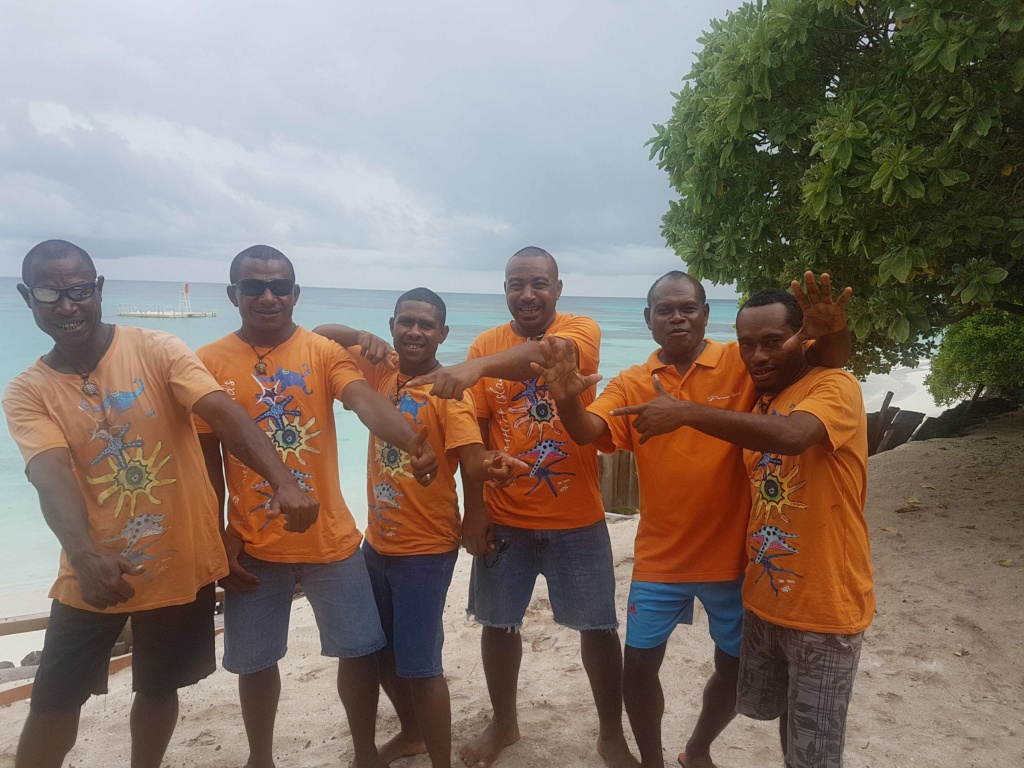Conflict Islands Hope Spot Celebrates Extraordinary Coral Reefs and Local Conservation Work
January 22, 2020
CONFLICT ISLANDS, PAPUA NEW GUINEA (February 5th, 2020)–
The Conflict Islands atoll is an isolated ring of 21 individual islands surrounded by brilliant blue water in the Milne Bay Province of Papua New Guinea (PNG). It spans 4.55km2 (1.76sp mi) and 21km (13mi) in area and length. Currently, the Conflict Islands are not under any protection by the PNG Government, although Conservation International conducted an ecological report which revealed something truly spectacular: the reefs hold more than half the world’s coral species– making the Conflict Islands one of the richest natural habitats in the world. Thanks to the atoll’s remote location, its vibrant ecosystem has been left virtually untouched. The islands have an incredible advocate; the organization Conflict Islands Conservation Initiative (CICI) has been hard at work over the last couple of years to keep the atoll’s ecosystem as healthy and stable as possible through their reef conservation projects and shark and sea turtle tagging programs.
The Conflict Islands have been declared a Hope Spot by international marine conservation nonprofit Mission Blue in recognition of the islands’ incredible reef condition index, and to honor organization CICI’s work in local education and establishing a Local Marine Managed Area (LMMA) for the preservation of these magnificent coral reefs and entire atoll ecosystem against the negative effects of a changing climate and illegal fisheries practices.
Hayley Versace (BSc), Hope Spot Champion and Project Manager of Conflict Islands Conservation Initiative (CICI) explains, “I only want the best for our neighboring communities. It seems they have been abandoned by their government and the rest of the world in regards to global climate change and access to reliable resources. Becoming a Hope Spot will help us to manage the ocean’s natural resources for the future. This will be for the betterment of our neighbors and surrounding oceans as a whole. The ocean has given me so much over my lifetime, it is time I start giving something back.”
Conservation International’s ecological report found that the reefs around Milne Bay held an identified total of 418 scleractinian coral species, which is more than half the world’s species. Seven of which are newly identified species. Included in the report were 954 species of molluscs and 798 species of reef fishes, with one new Pomacentridae species identified (Allen et al 2003). The Conflict Islands are also an important nesting location for the critically endangered hawksbill turtle (Eretmochelys imbricata) and the endangered green sea turtle (Chelonia mydas), hammerhead sharks (Sphyrnidae), and several other shark species. CICI also runs research programs to tag sharks and study sea turtle nesting sites and their eggs and employs local island residents as Reef Guardians.
CICI partners with other isolated, island communities to provide donations, community awareness, training and education to establish marine protected areas. In July 2019, CICI hosted a Reef Guardian Week where individuals picked by their communities stayed on Conflict Islands and were professionally trained by CICI’s marine biologists to conduct reef ecological surveys at their own chosen reef sites that they want to manage for the future.
The Sea Women of Melanesia, a program by the Coral Sea Foundation, which CICI helped run on the conflict Islands in September 2019 included training 17 local women in Milne Bay in PADI diving courses and coral reef monitoring and surveying techniques. It also held the first of its kind, in the bringing together of the Engineer and Deboyne community leaders and landowners to a meeting in Conflict Islands, for discussions in creating and implementing 15 new LMMA’s throughout the Milne Bay Province. PADI generously donated 50% off all training materials for the participants, hats and t-shirts for the women.
Donating $20,000 AUD Carnival Australia was a major sponsor of the event empowering these local women to learn about their resources and start the process of getting their home reef, livelihoods and fishing areas protected by the law and local level government. CICI is working with these women to encourage eco-tourism and bring cash income to the women and their communities who are usually cash-poor. Employment by local tourism operators, because of the new skills, providing snorkeling tours and acting as a guest for cruise ship visits from the Carnival brand also goes a long way in supporting the local communities.
CICI’s upcoming plans building on the training and educating that these communities have already received is to set up their own Local Marine Managed Areas around their island reefs to survey for future applications for Government-supported and funded MPAS and LMMAs in the Milne Bay Province. Conflict Islands is the “ground zero” for training, educating and employment of local communities.

CICI also has plans for the introduction of training and building of Bech de Mer seeding and giant clam gardening facilities here and in the local communities to help secure the futures as their neighbors’ population grows. This will ensure economic sustainability and good resource management practices, within the communities, that will not only take the pressure off of the local reefs but increase the health of the communities and financial security will hopefully be reached. This project will also be heavily funded and supported by Carnival Australia’s Pacific Partnership Program.
Ian Gowrie-Smith, owner of the Conflict Islands and CEO of CICI says, “Buying the islands brought with it the opportunity and responsibility to protect them and their surroundings. CICI was founded to address this formidable challenge given local and external pressures.”

CICI has agreements with the clan leaders and Ward Members, Mr. Madiu Peter, Mr. Kuli Ben, Mr. Nonio Loasne and Mr. Sammy Fifita from the Deboyne Group and, Mr. Edward Digwaleu and Mr. John N Philip of the islands to respect the rules of Conflict Islands, including a “no-take” policy of nesting turtles, their eggs and a “no-take” policy of coral reef fish within the atoll. For this, CICI supports them with medical supplies donated by City Pharmacy, education and training as environmental officers and conservationists.
Conflict Islands coral reefs are some of the last remaining stable reefs in the world. This atoll has the potential to maintain and sustain a richly diverse marine ecosystem. CICI’s work is working to change people’s outlook on the ocean and the role the sea plays in everyone’s wellbeing. Through continued education and awareness, we can create a healthy future for marine life– and humans– who are facing what might be the biggest global challenges that come along with a warming planet.
About Mission Blue and Hope Spots
Led by legendary oceanographer Dr. Sylvia Earle, Mission Blue is uniting a global coalition to inspire an upwelling of public awareness, access, and support for a worldwide network of marine protected areas – Hope Spots. Hope Spots are special places around the world nominated by members of the public to draw awareness to their unique values that offer “Hope” to the ocean’s future. Under Dr. Earle’s leadership, the Mission Blue team implements communications campaigns that elevate Hope Spots to the world stage through documentaries, social media, traditional media and innovative tools like Google Earth. Mission Blue embarks on regular oceanic expeditions that shed light on these vital ecosystems and build support for their protection. Mission Blue also supports the work of conservation NGOs around the world that share the mission of building public support for ocean protection. The Mission Blue alliance includes more than 200 respected ocean conservation groups and like-minded organizations.
About Conflict Islands Conservation Initiative
The work of the Conflict Islands Conservation Initiative (CICI) began in 2017 and was established as a charitable trust in 2018 to garner financial, human and other support to protect and conserve the natural environment of the Conflict Islands group and its surrounding and connected marine habitat.
Realizing that the Conflict Islands are a pristine coral reef habitat with many endangered species relying on its persistence, atoll custodian Ian Gowrie-Smith set out to protect and conserve this ecologically important ecosystem. The continuing environmental crisis, including anthropogenic climate change and the unregulated, illegal harvesting of endangered turtles and sharks, led Gowrie-Smith to conclude that ”Doing nothing is simply no longer an option!”.
Our goals call for sustainable ecological and economic conservation and management arising from a concerted and passionate effort from all our affiliates and partners. CICI plans to become a world-renowned conservation organization by establishing itself as a registered charity and registered environmental organization. To protect, conserve and enhance the natural environment, habitats and species of the Coral Sea with a particular emphasis on the area within and around the Conflict Islands Milne Bay Province of Papua New Guinea (PNG), and the roles this region plays in its connectedness to the Great Barrier Reef (GBR) through our joint sharing of the Coral Sea.
If you want to be a part of this movement, you can volunteer to assist with their Turtle Monitoring, Coral Reef and Fish, Coral Gardening and Shark and Ray Monitoring Programs. To apply head to www.cici.net.au/volunteer, all you need is a passion for marine conservation.













